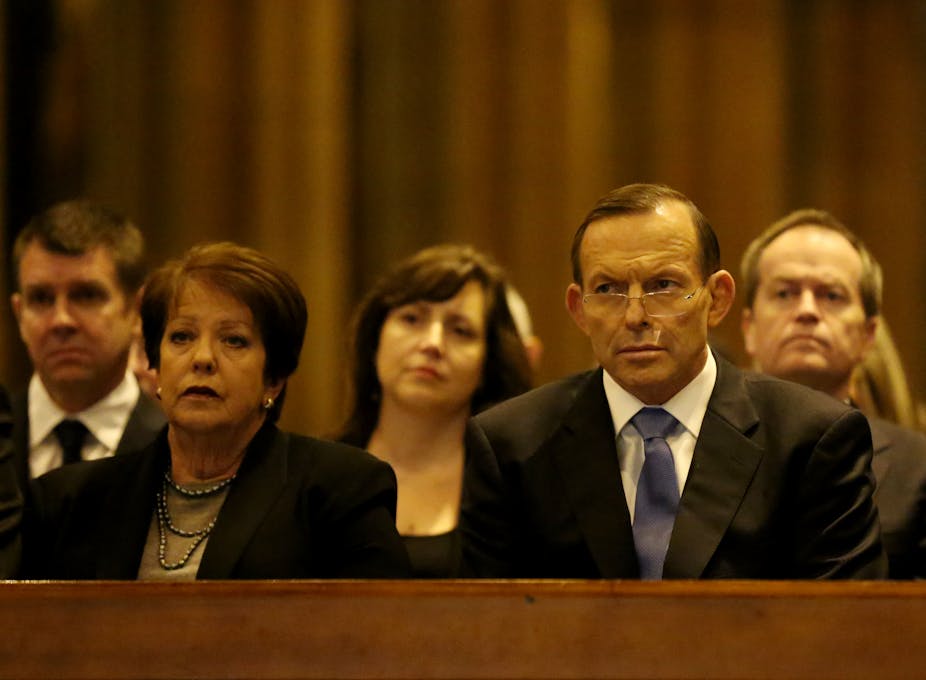Cabinet’s national security met tonight to discuss the latest developments in the MH17 tragedy, especially securing the bodies of victims, as the death toll of Australian citizens and permanent residents was revised up to 37.
An additional permanent resident, who lived in Western Australia, has been identified as being on the flight, taking the Australian total to 28 citizens and nine permanent residents, among the 298 passengers and crew killed when the plane was shot down over rebel-held territory in East Ukraine.
Foreign Minister Julie Bishop has flown to the United Nations in New York.
Prime Minister Tony Abbott said the cabinet committee discussion was dominated by concern the ensure the bodies, especially those of the Australians, were treated with respect and taken to where a proper investigation could be carried out.
He told the Nine Network tonight that what was happening was “intolerable”.
He was seeking to speak with Russian President Vladimir Putin and if he were able to do so, would put to him that Australia was profoundly concerned about what was happening to the 298 bodies. “I’ll be putting the case for common decency to him.
"If he wants to be a friend of Australia, a friend of decency and humanity, all assistance he might be able to offer would be appreciated at this time.”
Australia wanted “dignity for the dead, justice for the living”.
Bishop was in New York to prosecute Australia’s case for securing the site and getting a full and fair international investigation. She would stay as long as needed.
Australia has circulated a draft resolution to be put to the Security Council, of which it is a member, demanding that those responsible for the incident be held to account and that all states co-operate fully with efforts to establish accountability.
Australia would be consulting with friends and allies to ensure that no steps were neglected to bring the bodies to a place where they would be treated with respect, Abbott said.
Earlier (before the number was revised) he told the ABC: “There are 36 people who call Australia home who have been snuffed out”.
He said his fear was that Russia “will say the right thing, but that on the ground interference with the site, interference with investigators, interference with the dignified treatment of bodies will continue”.
Australia is sending officials from the Department of Foreign Affairs, the Australian Federal Police and the Australian Transport Safety Bureau to Ukraine.
The site was “absolutely chaotic”, Abbott said this morning.
“The kinds of things that would normally be happening in an air crash site are simply not happening and this just makes it absolutely imperative … that Australia does everything we can to recover the bodies, to ensure the site is secured, a proper investigation is done and then justice is secured.”
He said that no one was really in charge. The plane came down in a Russian backed rebel controlled territory. The Ukrainians would like to take charge, he said, which was how it normally would be. “But that’s very difficult here because of the conflict between the Russian-backed rebels and the central government in Kiev.”
Abbott said he had spoken to President Petro Poroshenko of Ukraine, who had invited Australia to fully participate in the investigation.
“The most senior [Russian] person that I have access to at this time is the trade minister [economic development minister Alexei Ulyukayev], who was in Sydney yesterday for meetings connected with the G20,” Abbott said. “I made crystal clear my concerns and dissatisfaction with the way this has been handed. Russian-controlled territory, Russian backed rebels, quite likely a Russian-supplied weapon. Russia can’t wash its hands of this.”
He said Bishop had sought a call with the Russian Foreign minister but “the Foreign Minister hasn’t been available”.

